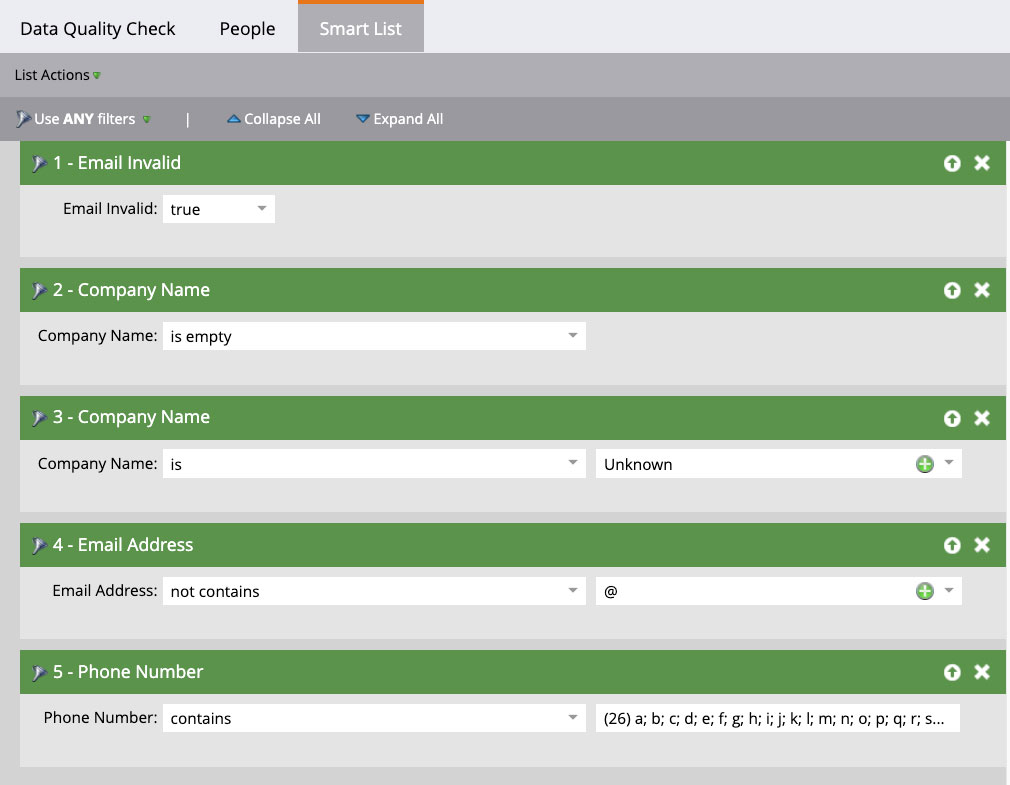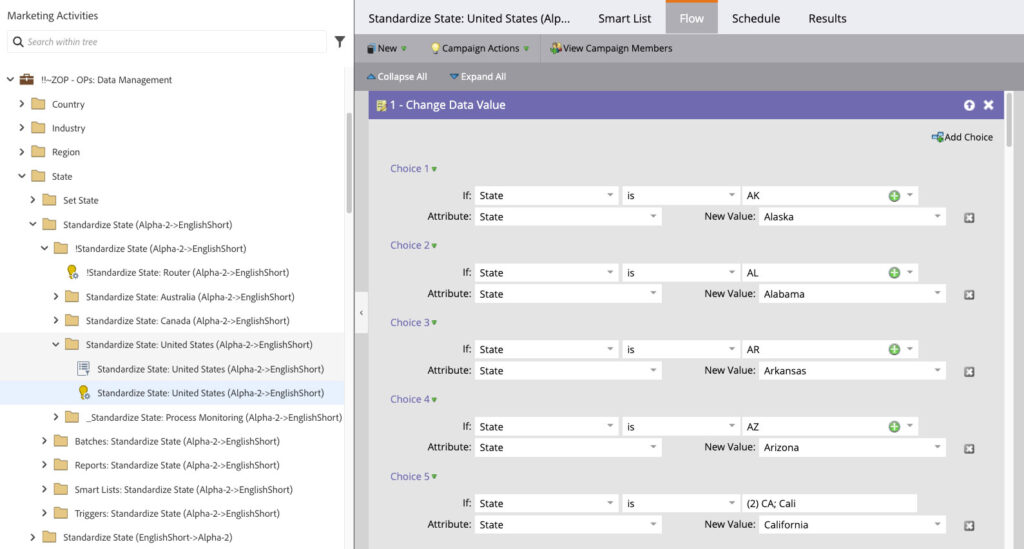Overview
Data can be one of the most valuable assets a company has, but not all data is inherently valuable. Data quality affects business decisions and ability for team members to act. Companies should audit the state of their data and take action to proactively support and to address issues with data quality.
Multiple Facets of Data Quality
The term “data quality” refers to how well the data can be used by a business for its intended purpose. For example, the marketing team regularly uses data points for audience targeting and campaign reporting.
There are many facets that make up the concept of data quality. The same data point may be considered “high quality” according to one aspect, but “low quality” according to another, so all facets should be considered.
One facet that can be fairly straightforward to assess is completeness – whether or not business-critical fields have values, for example. Validity considers whether a field’s value is reasonable, such as whether a phone number field contains only numbers and not letters, or an email address field contains an @ symbol, for example. These facets may be easier to audit.
Some data quality facets may or may not be readily accessible, depending on the tech stack. Timeliness looks at the recency of the data. Inevitably, data becomes outdated over time, so being able to see when the field on a record was last updated can be valuable. Uniqueness refers to one data entry per item; in other words, not duplicated. Depending on the marketing automation platform, finding duplicate records may be simple – though reconciling them may take a lot of effort.
Other data quality aspects may be more challenging. Accuracy and reliability – whether the data represents reality – may be difficult to measure systematically. A name could be misspelled or the completely wrong job title entered for a person, but it could look realistic or reasonable to an outside person. This type of error may not be uncovered until sales reaches out to the person and is informed of the mistake. Consistency considers whether data has the same meaning when coming from different systems/teams. This may be identified as part of a more thorough discussion during a collaborative working session.
Data Impacts Decisions
Because data is critical to making good business decisions, every organization should prioritize making their data useful for marketing, sales, customer service and other departments.
Data quality has a cascading effect. A Marketo Engage marketing funnel or revenue model won’t be useful if it relies on data that is frequently missing. Revenue reporting is only as good as the data that feeds into it. Thus data quality initiatives will often come into play based on other goals and outcomes desired by an organization for which clean data points will be critical.
Data Quality Prompts
Data quality problems can be a real blocker for business, so becoming aware of data quality and potential areas for improvement should be done the sooner the better.
Initiatives and occurrences that may spark the immediate need for increased data quality efforts include:
- Call to make more data-driven decisions, such as in the context of closed-loop marketing
- Specific reports requested by leaders
- Desire to mature in audience targeting and lead management efforts within the marketing automation platform
- Marketers or sales team members commenting that they can’t do their job due to bad data
- Complaints from prospects and customers about communications that are mistargeted or that contain incorrect information
Analysis and Action
The first step is to analyze the data. In Marketo Engage, this can include smart lists to look for records with empty key fields and people performance reports grouped by a key field to see existing values in the field. Smart lists can also identify records that haven’t been engaging or updated – they may contain old data or the person may even have left their company – but be mindful of the Marketo Engage data retention policy as there are time limits to activity data such as data value changes and form fills.

A comprehensive lead source operational program can enable the team to further assess quality of data by source. If one source has a high percentage of low quality data, such as invalid email addresses, it may not be a source you want to use long term.
Once you have the foundational context for data quality in your instance, you can begin to make changes to prevent and correct data quality issues. Form management can be a key method, since many records enter Marketo Engage through forms. Use global forms so critical fields are consistently collected. Use the “select” field type as appropriate so users choose a value from a limited list rather than enter variations or typos for fields such as Country. Input masking can be used to restrict the format of text field entry, such as phone numbers to a specific number/format of digits. These practices will increase the completeness and validity of the data.
When differing values are coming from other sources and a “picklist” of acceptable values cannot be enforced, a centralized data standardization operational program may be useful to convert values to the standard value. This can help with consistency. When there are gaps in data, lead enrichment with vetted, quality data vendors can supplement the data on hand for completeness.

In general, centralized operational framework – stamping fields based on consistent criteria rather than decentralized across individual marketing programs – and cloneable program templates – to ensure activities and program statuses are captured consistently – can also help to address consistency as well as completeness.
Consolidating multiple data points can make it easier for data to be defined and interpreted the same. A Marketo Engage marketing funnel or lifecycle reduces many data points to a single field value that can be referenced across many purposes. Segmentations can combine multiple, related data points, such as similar fields from different sources. Be mindful of the limit of segmentations in an instance and plan out the best use for them.
All departments within a business need to work together to determine what data is required and agree on values and meaning. Agreeing on a system of record can aid with this as well. Field naming conventions and including a description in a data dictionary – entered in Marketo Engage and the CRM as well – can facilitate understanding and proper import and use of data throughout the organization.
Shared Data Responsibility
The marketing operations team will likely play a large role in setting up reports and processes to support data quality. For example, they would be responsible for developing and maintaining Marketo Engage operational programs, creating and managing forms, reviewing field types and more.
Typically marketing operations will need to collaborate with sales operations on related items on the CRM side. This would include creation and maintenance of picklist field values, data validation rules and data intake work processes.
Conclusion
Data quality is critical for any organization. Marketing operations can take a leadership role in identifying and addressing data quality issues to support advanced targeting, lead management and actionable insights.







